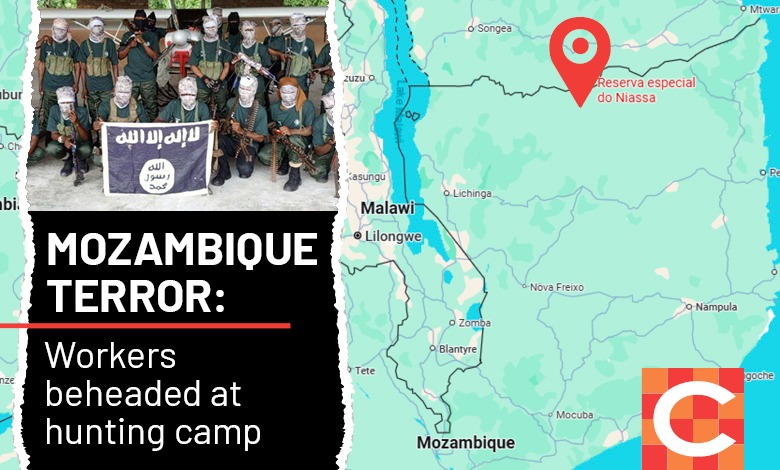
Isis behind beheadings destruction of luxury SA-owned hunting camp in Mozambique
Two recent attacks have rocked northern Mozambique, where two workers of a luxury hunting lodge were beheaded, allegedly by Isis.
In the first attack, on April 19, insurgents targeted the Kambako hunting camp in the Niassa Special Reserve in Cabo Delgado, which is owned by South African company Chapungu-Kambako Safaris.
The camp was ravaged, and two workers were killed.
AIM, Mozambique’s official news agency, reported that a group of 40 terrorists carried out the attack.
According to the news agency, four workers were captured and the insurgents demanded a ransom of three million meticais (about R860 000) for their release.
“What wasn’t stolen – including fuel, food stores, protective clothing and vehicles – was deliberately destroyed in a fire that razed the entire camp to the ground,” reads a statement released by Chapungu-Kambako Safaris.
Founding partner Jumbo Moore says the camp had recently been stocked with the hunting season’s full supply and drink rations. Traditionally, hunting season in Mozambique starts on May 1.
“All diesel and petrol tanks were full, including aviation fuel, and we had just received crucial equipment: Vehicle, truck and tractor tyres and spares, first shipment of solar and inverter systems, new two-way radios, water pumps – everything needed to support a season of remote operations. The bandits would have seen our trucks passing through various villages on the way in over several days and devised a plan to obtain these valuable supplies.”
Jumbo said they were in shock about what had happened.
“It’s devastating to see 20 years of hard work and commitment to conservation and community wiped out in a single day. But this will not be the end of Kambako.”
According to AIM, the Niassa Special Reserve consists of six hunting blocks, which are managed by private companies. Kambako is considered one of the largest hunting operators in Mozambique.
The second attack happened on April 29 and targeted the Mariri hunting camp, also situated within Niassa.
Information on the second attack is still limited, but local police have confirmed that they were aware of the incident and that it was being investigated, reported Club of Mozambique.
On April 30, an image was released on social media by Amaq News Agency, affiliated with Isis, claiming the attacks were carried out by fighters of the Islamic State.
Caxton Network News used AI to translate the text on the image, which loosely translates to:
“The fighters of the Islamic State attacked and burned a tourist site belonging to the Christians and killed six soldiers from the Mozambican army in Niassa Province, Northern Mozambique.”
According to the statement, the site that was attacked is considered ‘one of the most luxurious tourist resorts frequented by foreign Christians and hunters to practice fishing and hunting activities in the region’.
The US Embassy in Mozambique issued a security alert to its citizens following the attacks. The embassy advised its citizens to be aware of the possibility of increased violence on the southeastern and eastern borders of the Niassa reserve.
It asked American citizens to reconsider travel to Niassa, the surrounding villages and hunting properties.
“The US Embassy in Mozambique continues to monitor the situation and remains committed to working with the government of Mozambique to counter violent extremism.”
According to information posted on Nagkantoor, a Facebook group run by veteran South African journalist De Wet Potgieter, Isis is increasingly planning and strategising in Mozambique. On April 24, he shared information saying that, according to intelligence sources, extremists had a meeting during the last weekend of Ramadaan in Xitaxi in the Muidumbe district. The following is an extract from the Facebook post, published with Potgieter’s permission:
The meeting was allegedly attended by most of Isis’s tactical commanders.
The central command structure’s planned attacks include:
An increase across the Cabo Delgado area, especially in the coastal areas of Macomia.
Reactivation in the Nangade district with the possibility of expanding to Palma.
A campaign of abductions with the aim to demand ransom for victims.
An increase in ambushes on major routes, including on the ED14, R380 and R698 routes.
Caxton Network News has reached out to the owner of Kambako to gather information on the current state of affairs at the lodge. An update will be published with his comment.





